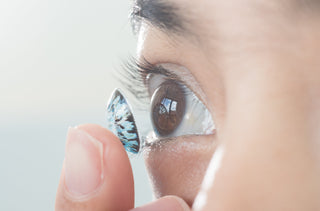Winter can be really hard on our bodies. The transition from hot to cold can quickly make your lips chapped and your hands rough. Did you know that winter conditions can also affect your eyes? Here are some tips to better protect them during the winter.
Wear Polarized Sunglasses
When the sun's rays reflect on the snow in winter, they can become twice as dangerous as they are in the summer. What is the best solution to protect your eyes? Wear sunglasses with polarized lenses! These will block reflections bouncing off of water and snow, allowing you to see more clearly without being dazzled. You will avoid exposing your eyes to the sun's harmful rays, which can increase the risk of cataracts, macular degeneration and of photokeratitis. This last condition is an inflammation of the cornea caused directly by prolonged exposure to the sun. It is also sometimes called "snow blindness" because it is more common in Polar Regions. For the best protection against ultraviolet rays, make sure your glasses have a UV 400 protection.
Protect Your Eyes From the Wind and Snow
It is strongly recommended to wear specialized glasses for certain winter sports, such as skiing and snowboarding. They protect you from wind, debris, as well as snow and ice that could potentially hurt you. Did you know that prolonged exposure to the wind can irritate the white part of the eyes? This can cause a yellow discolouration called Pinguecula, which can be permanent.
Wearing Contact Lenses With Ski Goggles
Have you ever thought about wearing contact lenses for winter sports? They can be very practical! Not only will you avoid damaging your glasses, but you'll also have a better field of vision, which is especially important when you're practising a fast-paced sport like skiing. Contact lenses can also easily be worn under non-prescription eyewear, such as alpine or cross-country ski goggles. You will also avoid fogging your glasses once you go back inside from the cold.
Keep Your Eyes Hydrated
In winter, our eyes tend to be much drier than in summer. The cold wind can also irritate or dry your eyes. If you feel that they are watery or that you need to close them more often, your eyes are probably dry. To counteract the effects of heating, which dries out the air, install a humidifier in your room. You can also put wet compresses on your eyelids if you feel that your eyes are tingling. Do not forget to stay hydrated by drinking a lot of water: your eyes and your skin will thank you! The use of lubricating drops can also relieve dry eyes. If the problem persists, do not hesitate to talk to your optometrist.
Just like our immune system, our eyes are more sensitive in winter than in summer, hence the importance of protecting them well. Having an eye exam at the recommended frequency from your optometrist is also essential to prevent eye problems. Make an appointment now at your closest IRIS store for your annual exam!





















































